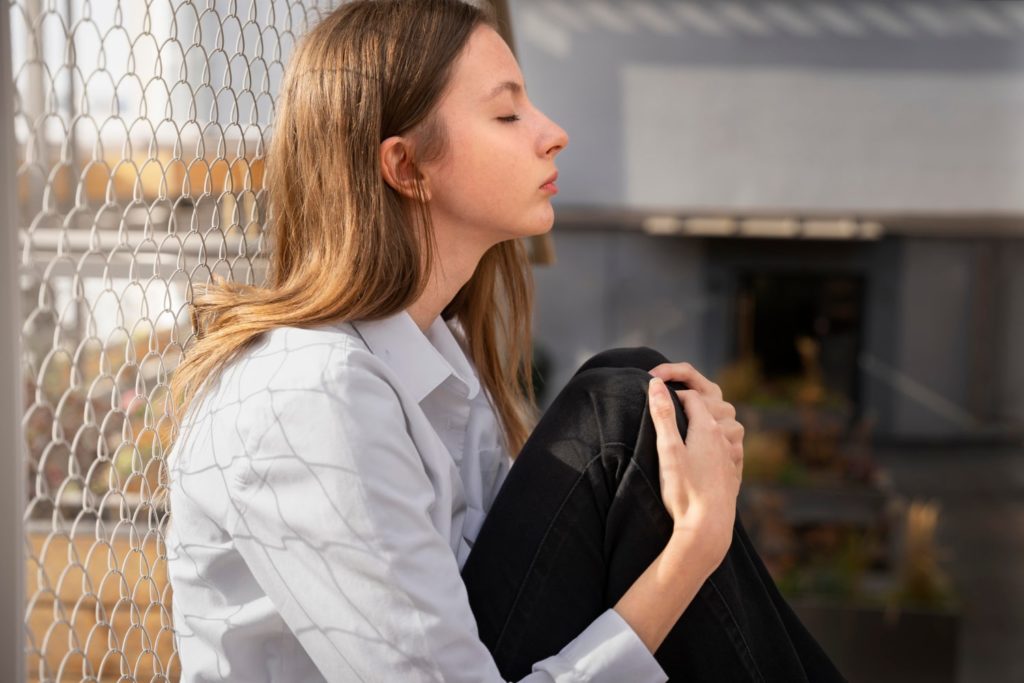
Teagan Fea
Dip (Clinical Hypnotherapy), Cert (Timeline Hypnotherapy), Cert (RTT Therapy Practitioner), Professional Member of Hypnosis NZ, Senior Facilitator (Mindfulness Works for Organisations)
Jump to:
Anxiety is an emotional state stemming from worry and fear. It activates the brain’s fight or flight response, releasing cortisol and adrenaline which prepare the body to confront or escape the perceived threat.
Anxiety disorders, including
- generalised anxiety disorder (GAD)
- panic disorder
- social anxiety disorder
significantly impair daily functioning and quality of life.
In today’s article, we will look into different factors that might cause anxiety, and how to recognise signs and symptoms of anxiety.
What is Anxiety?
Anxiety affects many people worldwide. As a hypnotherapist, approximately 85% of my clients struggle with symptoms of anxiety.
Anxiety is more than just feeling stressed or worried
It is an emotional state underpinned by feelings of apprehension, unease, and fear about future events.
It is also accompanied by physical symptoms such as:
- rapid heartbeat
- tightness in the chest
- tight muscles
- feeling of butterflies in the stomach
Anxiety disorders, including generalised anxiety disorder (GAD), panic disorder and social anxiety disorder, can significantly impair daily functioning and quality of life making the person afraid to leave the house, meet people they don’t know, or speak up in the workplace, among other things.
Anxiety and stress are often understood to be the same condition however they are different. Stress is any demand placed on the brain or body whereas anxiety stems from worry, unease and fear, activating the brain’s fight or flight response.[1]
This response triggers the release of cortisol and adrenaline (stress hormones), which prepares the body to stay and fight or run away from perceived threats.
RELATED — Understanding Stress: The Silent Killer
When the stress response is activated, the heart rate accelerates to supply more oxygen to muscles to mobilise them for action, while the immune and digestive systems become less active because all the body’s energy is needed to deal with the threat.[2]
It is important to note that the brain reacts in the same way as if the threat were real or imagined (i.e. if you think that something is a threat it will react in the same way as if it were an actual threat).
With chronic anxiety, the body remains in a perpetual state of fight or flight, known as chronic stress.[3]
Why Does Anxiety Happen?
Anxiety is caused by the following:
- trauma
- low self-esteem
- alcohol and drug use
- environmental stress
- genetics
- brain chemistry imbalances
- medical conditions
- overuse of electronic devices
Trauma
The brain’s job is to keep us alive and safe. The way we think and feel and the actions we take are influenced by our perception of safety and danger based on our past experiences.
Anxiety can result from traumatic experiences
Traumatic events are categorised as either “little t traumas” or “big T traumas”.
“Little t traumas” include distressing events such as parental divorce, bullying, living with a parent in addiction, or rejection.[4]
“Big T traumas” involve life-threatening situations such as natural disasters, physical violence and/or physical or sexual abuse.[5]
As we age, the brain remains vigilant for threats, leading to heightened anxiety, a response conditioned to ensure safety. This heightened state of awareness serves to protect us against potential harm.
This heightened state of awareness serves to protect us against potential harm.
Low self-esteem
From our life experiences, particularly those that impacted us as a child, we can create beliefs that lead to low self-esteem.
These include beliefs such as “I am not good enough”, “I can’t do it” or “I am a failure”. Beliefs such as these can lead to anxiety because we worry about what people may think about us, and or worry that we may fail.
Withdrawal from Drugs or Alcohol
Withdrawal from drugs or alcohol can cause anxiety due to physiological and psychological dependence.
Suddenly stopping the use of these substances disrupts neurochemical balance, which can trigger symptoms of anxiety, restlessness and insomnia.[6]
Environmental Stress
Financial instability, uncertain living conditions, social pressures and relationship challenges can cause anxiety because of the perceived threat to one’s inner and outer sense of security. This also includes exposure to violence.
Genetics
Genetic factors increase susceptibility to anxiety by affecting neurotransmitter function and brain circuitry.[7]
A family history of anxiety may indicate inherited genetic vulnerabilities.[7] A genetic predisposition doesn’t mean that a person will suffer from anxiety; however, if this is combined with environmental and psychological factors, it may contribute to a person developing an anxiety disorder.
Imbalances in the Brain
Imbalances in neurotransmitters and brain circuitry can disrupt communication pathways and lead to anxiety disorders.[8]
Dysregulation in emotion processing regions like the amygdala and prefrontal cortex can also contribute to anxiety.[9] These imbalances result from various factors including genetic predispositions, environmental stressors, and substance abuse.
RELATED — Introduction to: Brain Health
Medical Conditions
Chronic illnesses such as:
- heart disease
- diabetes
- thyroid conditions
- hormonal imbalances (including menopause) can cause anxiety.
Changes in neurotransmitter levels and hormonal balance can contribute to anxiety disorders.[10]
RELATED — Menopause: Guide to Signs and Symptoms
Overuse of Electronic Devices
Studies show that the amount of time spent each day using electronics is strongly correlated with anxiety and depression.
Adolescents who use electronic devices for more than three hours a day are more likely to experience anxiety symptoms.
Adults who used screens for seven or more hours per day were more than twice as likely to have been diagnosed with anxiety.[11]
Anxiety Signs and Symptoms
Anxiety manifests in various physical and psychological symptoms. This can include:
- difficulty sleeping and concentrating
- dry mouth
- derealisation (feeling detached from reality)
- gastrointestinal issues
- heart palpitations
- fear or panic
- rapid breathing/hyperventilation or shortness of breath
- rumination (repetitive negative thinking)
- feeling a sense of dread
Difficulty Sleeping
An anxious and worrying mind commonly disrupts sleep patterns, leading to difficulties falling asleep or staying asleep. This can result in insomnia and daytime fatigue which negatively impacts cognitive function.
Sleep disturbances are intricately linked to anxiety because not sleeping can exacerbate anxiety and vice versa. Addressing sleep difficulties is crucial in managing anxiety symptoms effectively.
RELATED — Why we sleep: The role of sleep in our healthy life
Difficulty Concentrating
Anxiety can impair concentration and cognitive functioning, making it challenging to focus on tasks or retain information. Heightened arousal and intrusive thoughts associated with anxiety make it difficult to focus on the task at hand.[12]
Lack of focus can significantly impact academic, occupational, and social functioning, contributing to further distress.
Dry Mouth
Dry mouth or xerostomia, is a common physiological symptom of anxiety, resulting from the body’s stress response. Increased sympathetic nervous system activity decreases saliva production, leading to dryness in the mouth.
Dry mouth can exacerbate feelings of discomfort and contribute to social anxiety in situations where speaking or interacting with others is required.[13]
Derealisation
Derealisation is a dissociative symptom of anxiety and is experienced as feeling detached from one’s surroundings or experiencing the world as unreal or dreamlike.
Dissociation often accompanies intense anxiety or panic attacks
Derealisation can be distressing and contribute to feelings of disorientation and fear.[14]
Gastrointestinal Issues
Anxiety commonly manifests with gastrointestinal (GI) symptoms such as:
- abdominal pain
- bloating
- nausea
- diarrhoea
The gut-brain axis plays a significant role in this relationship with stress and anxiety affecting gut function.
This is also due to the stress response which when activated, reduces activity in the gastrointestinal tract as energy is diverted to the heart and muscles. GI symptoms can exacerbate anxiety and vice versa, creating a cycle of distress.[15]
Heart Palpitations
Heart palpitations, or the sensation of rapid or irregular heartbeat, are a common physical symptom of anxiety.
Increased sympathetic nervous system activity and the release of adrenaline contribute to palpitations during times of heightened anxiety because the body pumps more blood to oxygenate the muscles to fight a threat or flee.[16]
Panic or Fear
Panic or fear is the cause of some anxiety disorders, often manifesting as sudden and intense episodes of overwhelming dread or terror.
Catastrophising about worst-case scenarios in the future is one of the root causes of anxiety.
Rapid Breathing
Rapid breathing or hyperventilation is a physiological response to anxiety, characterised by increased respiratory rate and shallow breathing.
Hyperventilation leads to decreased carbon dioxide levels in the blood, contributing to symptoms such as dizziness, lightheadedness, and tingling sensations.
Rumination
Anxiety often begins in the mind. An anxious person will ruminate about past or future events (negative experiences or worries) and cycle these thoughts over and over.
This can lead to increased distress and difficulty in problem solving. Rumination prolongs and exacerbates anxiety making it challenging to break free from the cycle of worry.
A Sense of Dread
A sense of dread or impending doom is a symptom commonly experienced by individuals with anxiety.
This feeling of intense apprehension or foreboding is often disproportionate to the actual threat present.
This is known as “catastrophising”, which can lead to a constant state of hypervigilance and distress, impacting a person’s daily life.
Related Questions
1. What different tests are there for anxiety?
Various tests for anxiety include:
- Generalised Anxiety Disorder 7 (GAD-7) scale
- Hamilton Anxiety Rating Scale (HAM-A)
- Beck Anxiety Inventory (BAI).
2. Can lack of sleep cause anxiety?
Yes, lack of sleep can exacerbate anxiety.
Insufficient rest affects brain function, increasing stress hormone levels and impairing emotional regulation, leading to heightened anxiety and difficulty coping with stressors.
3. Why does anxiety make you impulsive?
Anxiety can trigger impulsivity due to heightened arousal and stress.
The brain’s fight or flight response reduces rational thinking, leading to hasty decisions as a way to quickly alleviate distress.
If you are interested in similar articles, please see our section on Mental Health.
References
(1) McEwen, B. S. Physiology and neurobiology of stress and adaptation: central role of the brain. Physiological Reviews, 87(3), 873-904. (2007).
(2) Morgan Griffin, R. 10 Health Problems Related to Stress That You Can Fix. (2014).
(3) Brady, K. T. Substance Use Disorders and Anxiety: A Treatment Challenge for Social Workers.
(4) Hetema, J. M., et al. A population-based twin study of the relationship between neuroticism and internalizing disorders. American Journal of Psychiatry, 158(2), 1352-1358. (2001).
(5) Corbett, R. Yale Center for Emotional Intelligence. (2020).
(6) Pittenger, C., & Duman, R. S. Stress, depression, and neuroplasticity: a convergence of mechanisms. Neuropsychopharmacology, 33(1), 88-109. (2008).
(7) Gottschalk, M. Genetics of generalized anxiety disorder and related traits. (2017). Retrieved from https://www.ncbi.nlm.nih.gov/pmc/articles/PMC5573560/
(8) Duman, R. S., & Aghajanian, G. K. Synaptic Dysfunction in Depression: Potential Therapeutic Targets. (2012).
(9) Roy-Byrne, P. P. Treatment-refractory anxiety; definition, risk factors, and treatment challenges. (2015).
(10) Neibling, K. Hormone Imbalances That Can Contribute to Anxiety. (2023). Retrieved from https://www.rupahealth.com/post/hormone-imbalances-that-can-contribute-to-anxiety
(11) Hamshari, S., Yaseen, S., Zayed, M. et al. Adolescents’ electronic devices use during the COVID-19 pandemic and its relationship to anxiety and depression levels: a cross-sectional study. BMC Psychiatry 24, 38. (2024). Retrieved from https://bmcpsychiatry.biomedcentral.com/articles/10.1186/s12888-023-05482-5
(12) Eysenck et al., Anxiety and Cognitive Performance: Attentional Control Theory. (2007).
(13) Veerabhadrappa SK, Chandrappa PR, Patil S, Roodmal SY, Kumarswamy A, Chappi MK. Evaluation of Xerostomia in Different Psychological Disorders: An Observational Study. J Clin Diagn Res. 2016 Sep;10(9):ZC24-ZC27. doi: 10.7860/JCDR/2016/19020.8437.
Retrieved from https://www.ncbi.nlm.nih.gov/pmc/articles/PMC5072074/
(14) Sierra, M. Derealization: A Conceptual History. (2009). Retrieved from https://societyforpsychotherapy.org/depersonalization-derealization-disorder-theory-treatment-and-advocacy/
(15) Mertz, H. Stress and the Gut. Retrieved from
https://www.med.unc.edu/ibs/wp-content/uploads/sites/450/2017/10/Stress-and-the-Gut.pdf
(16) Liu, X. Depressive symptoms, anxiety and social stress are associated with diminished cardiovascular reactivity in a psychological treatment-naive population. (2023).






